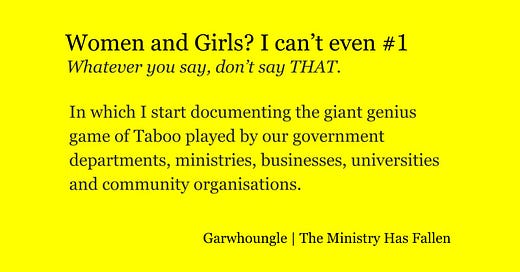For years now my mates and I have been quietly exchanging examples of how dirty, gross and unseemly New Zealand institutions really find women and girls, so we’re taking a leaf out of the brilliant Milli Hill‘s substack The Mule. Her series The Word is Woman documents all the clever ways Brits avoid using the terrifying and ghastly words which are to do with females, their bodies and their experiences. We highly recommend you subscribe to The Mule but right here we’ll be documenting the New Zealand version.
We also invite people to send us NZ examples, print or web, and we’ll add them to our next post, and in that way we hope Women and girls? I can’t even, can become a repository for those, like us, keen to document the giant near genius game of Taboo played by our government departments, ministries, businesses, universities and community organisations. That’s the game where you have to describe a word without ever ever saying it. And that’s the game where the name we use to describe ourselves is deemed too offensive to say out loud, and where women and girls, our full complex and human selves are reduced to body parts and functions.
Women and girls are being removed from public discussions and public life.
Let’s get started.
Spotted on Facebook on 25/11/23
Aaah, the continued dismantling of the once proudly pro-women occupation of midwifery. The obsession with inclusivity is exclusive and elitist and driven by a handful of activists in Wellington who are elevating the ideology of a few above the wishes of the vast majority of women and mothers who wish to be known as women and mothers.
Spotted on 24/11/23
When ideology takes over public healh messaging, fewer women will understand the message. In this case fewer women will do regular cervical screening. This will cost lives. It goes against all common sense and all sound public health communication strategy. It’s great that the term wāhine is used, but what about women? This mealy-mouthed, non-plain language announcement will disproportionally affect women with low literacy and women whose mother tongue is not English or te reo Māori.
Spotted on the The Period Place 26/11/23
The Period Place does some great work looking at period poverty, but they have stopped mentioning the one and only biological class that is affected by periods. They rightfully discuss the stigma associated with periods but clearly see no irony in admonishing that stigma while themselves facitiliating stigma against using the words women and girls.
Send us examples, or put them in the comments below.







There is the Midwifery Council's scope of practice that excludes the words woman(en) (except in the te reo version) and mother and delivers services not to women or mothers but to 'whānau who are planning a pregnancy, pregnant, birthing, and postnatal'. https://midwiferycouncil.health.nz/Public/10.-Aotearoa-Midwifery-Project/Aotearoa-Midwifery-Project-Scope-of-Practice.aspx There was a second round of consultation that finished a year ago and which had not been reported back except to certain insiders. But just this month there has been an announcement that the new scope of practice has been adopted and will come into force in July next year. There are many other problems. The scope of practice is a legal document that describes the practice of midwives but this doesn't do that. The previous version of the scope of practice was supported by only 1 of 14 Midwifery organisations. The feedback was utterly scathing. But nothing changed. No feedback report was released for this second iteration and yet it was hardly likely to have been more positive. It provides services to whanau rather than women in direct conflict with the Health and Disability Acts provisions about informed consent where medical services are delivered to individuals. https://www.midwiferycouncil.health.nz/common/Uploaded%20files/eMidpoint/eMidpoint%20November%202023.pdf
This is awful... Trampling all over women again... I fear for my daughter